Home | Search | The Artists | Teaching | Hiring | About This Site | Contact Us

Arabic Percussion
Milwaukee, WI
Milwaukee’s Village Bazaar
Welcome to the Village Bazaar! In Middle Eastern countries, bazaar is a common word meaning market or store. Hamid and Kim started their store in 1972 in the village of Wauwatosa and then moved it to Milwaukee. They kept the name so that their customers would know it was the same store. They like the name because it combines American and Middle Eastern cultures, just like their lives do.
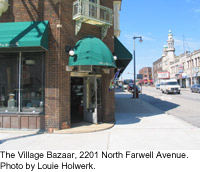 The Village Bazaar is both a
store and a studio. Kim and Hamid sell art from all over the world, but the store is also where Hamid makes his drums. Come inside!
The Village Bazaar is both a
store and a studio. Kim and Hamid sell art from all over the world, but the store is also where Hamid makes his drums. Come inside!
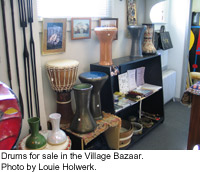 Here’s the part of the store where some of
Hamid’s drums are displayed. The style of tabla he makes most often is the light brown one on the black shelf. Let’s go downstairs to his workshop and see how he makes them.
Here’s the part of the store where some of
Hamid’s drums are displayed. The style of tabla he makes most often is the light brown one on the black shelf. Let’s go downstairs to his workshop and see how he makes them.
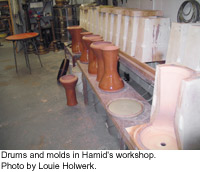 Hamid makes his tablas out of clay, using a
process called slip-casting. Slip-casting requires molds, liquid clay called slip, and a special oven or kiln.
Hamid makes his tablas out of clay, using a
process called slip-casting. Slip-casting requires molds, liquid clay called slip, and a special oven or kiln.
Watch the step-by-step process!
Hamid makes more than tablas. Another type of drum he makes is the
riqq, an Arabic instrument similar to a tambourine. The riqq can be played two ways, “classical” or “modern.” The
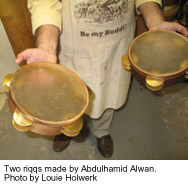 classical
style is very hard to learn, so most people play it
modern. Hamid uses fish skins for the heads of his riqqs too.
classical
style is very hard to learn, so most people play it
modern. Hamid uses fish skins for the heads of his riqqs too.
Hamid also makes tabl baladi. This is a large, two-headed drum, twelve inches deep and twenty inches across. The name tabl baladi comes from the Arabic word taboul, meaning “large drum.” The sound of the drum is large as well. It is used for outdoor wedding celebrations, parades, and to wake Muslims before dawn during the month of Ramadan so that they don’t miss their morning meal.
You can see examples of Hamid’s drums in the image below. A riqq is in the center, surrounded by three tablas. The big drum to the right is a tabl baladi. The drums to the left are tars, made in six different sizes. The tar is shallow drum with a four-inch deep frame. Its diameter ranges from fourteen to twenty-four inches. The tar’s deep sound goes well with the tabla’s higher tones.
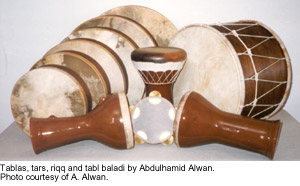
Go “Forward” to Hamid’s Traditions Page to find out even more about these beautiful drums and how they’re used in Arabic culture!

For Educators:
Home | Search | The Artists | Teaching | Hiring | About This Site | Contact Us
